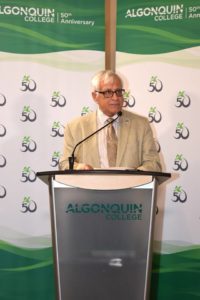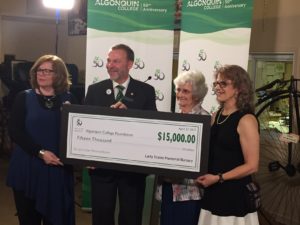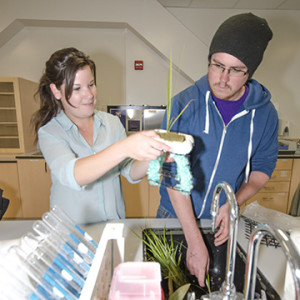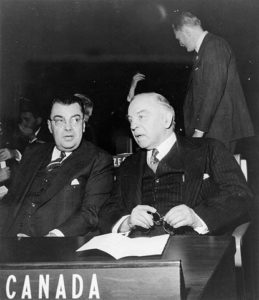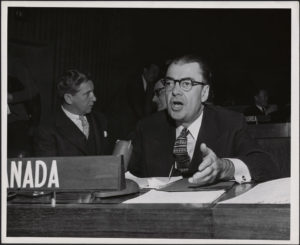The New Year always brings new perspectives and for many people a list of goals. One of those goals might be focused on career development or educational pursuits that can bring more joy to someone’s life.
 This winter, Algonquin College’s Pembroke Waterfront Campus has freshened up its Continuing Education offerings with several new classes that offer either professional development opportunities or practical learning experiences that can be applied in the workplace or at home. A few examples include safe operation of a chainsaw or the working at heights certification course.
This winter, Algonquin College’s Pembroke Waterfront Campus has freshened up its Continuing Education offerings with several new classes that offer either professional development opportunities or practical learning experiences that can be applied in the workplace or at home. A few examples include safe operation of a chainsaw or the working at heights certification course.
Each term the college reviews feedback it receives from students as it plans new offerings. That’s where the idea to offer an advanced seniors computer course came from. This course has been designed for seniors who already have a good working knowledge of computer applications, but would like to enhance their skills in using popular software programs like Word and Powerpoint. There is also a social media component to the course, something that will really help seniors who may have a volunteer position that requires them to promote their organization.
Dementia affects more than 46-million people worldwide. The disease primarily strikes elderly people and when it does it can be very difficult for the patient and their family. The college is offering two dementia courses this winter, one for families to better help them understand the disease and how to cope with it, and the other for healthcare professionals.

Medical terminology is a pre-requisite for office administration professionals to work in many healthcare settings such as hospitals and doctor offices. Having the course can open many doors for anyone who is interested in working in a healthcare environment. This course will be offered over several evenings beginning in mid-February.
On the playing field, athletes and children can move quickly, making it difficult to get action shots with your camera. The new Sports Photography class is intended to help Moms and Dads and photography enthusiasts get better photos during sporting events like hockey and soccer games.
For history buffs, Pembroke’s Early Years in Pictures will be a fascinating look back at our city’s history. Led by Champlain Trail Museum curator, Angela Siebarth, the presentation will feature many never before seen photographs that tell the story of Pembroke’s early settlers.
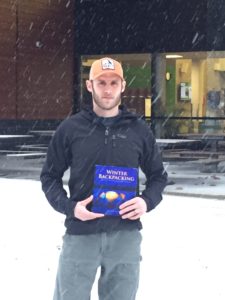 Ben Shillington has spent a lot of times in some of the coldest places on earth, like Lake Winnipeg, where a few years ago he led a winter fat biking expedition across the frozen lake. He’s also written a book on winter travelling. Shillington will bring his expert knowledge to the classroom when he teaches a course on winter camping that will be of interest to anyone who enjoys Canada’s coldest season and wants to experience it outdoors.
Ben Shillington has spent a lot of times in some of the coldest places on earth, like Lake Winnipeg, where a few years ago he led a winter fat biking expedition across the frozen lake. He’s also written a book on winter travelling. Shillington will bring his expert knowledge to the classroom when he teaches a course on winter camping that will be of interest to anyone who enjoys Canada’s coldest season and wants to experience it outdoors.
Other new courses being offered include an infant and toddler sleep seminar, acrylic painting with Pam McNichol, Moroccan cooking and other food preparation courses. There are also some popular returning courses such as grant proposal writing.
Registration is now underway in person at the college or online. Happy New Year.
Posted by Jamie Bramburger, Manager of Community and Student Affairs



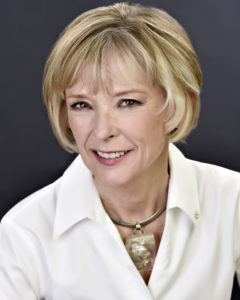

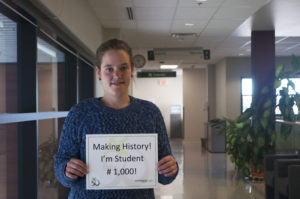

 I remember the first time I asked my mentor to mentor me. I was quite nervous and afraid she would say no. I didn’t realize at the time that I was being silly. Why would she say no to my request – she was one of the most engaging, encouraging and respectful people I had ever met and these were the traits that inspired me to ask that awkward question, “would you mentor me?”
I remember the first time I asked my mentor to mentor me. I was quite nervous and afraid she would say no. I didn’t realize at the time that I was being silly. Why would she say no to my request – she was one of the most engaging, encouraging and respectful people I had ever met and these were the traits that inspired me to ask that awkward question, “would you mentor me?” I came into formalized mentoring later in life, and only after an abundance of work experiences and mistakes. I have to admit when I think back, there were mentors but they often took on the guise of teachers and coaches, picked not by me but by the activities I participated in. It was only into my 30s that I started to actively look for mentors. I started to make a list of people whom I held in high regard in the community and that I believed I could learn from.
I came into formalized mentoring later in life, and only after an abundance of work experiences and mistakes. I have to admit when I think back, there were mentors but they often took on the guise of teachers and coaches, picked not by me but by the activities I participated in. It was only into my 30s that I started to actively look for mentors. I started to make a list of people whom I held in high regard in the community and that I believed I could learn from. For all these reasons and more, mentoring and giving back to the community through mentoring is one of my core values, and I believe I am lucky to be able to guide and help students reach their own goals and achieve their dreams.
For all these reasons and more, mentoring and giving back to the community through mentoring is one of my core values, and I believe I am lucky to be able to guide and help students reach their own goals and achieve their dreams.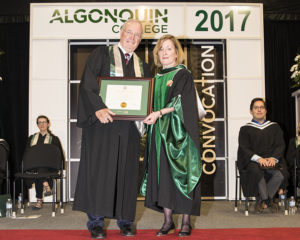 Let’s start with former Prime Minister,
Let’s start with former Prime Minister,  A few days before the graduation ceremony, one of the Pembroke Campus’s most successful graduates was being celebrated. Country Music Artist, Jason Blaine, was honoured with a plaque on a computer lab at the campus for raising $100,000 towards the building costs of the Waterfront Campus, which opened in 2012.
A few days before the graduation ceremony, one of the Pembroke Campus’s most successful graduates was being celebrated. Country Music Artist, Jason Blaine, was honoured with a plaque on a computer lab at the campus for raising $100,000 towards the building costs of the Waterfront Campus, which opened in 2012. 


